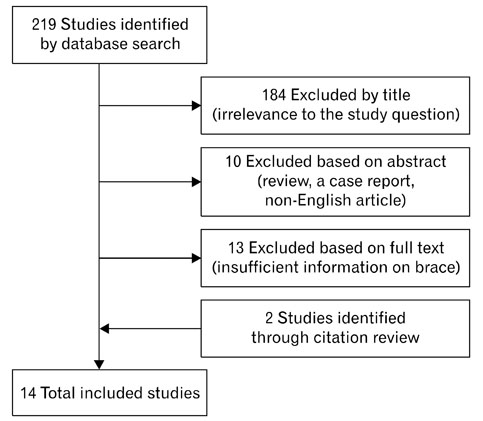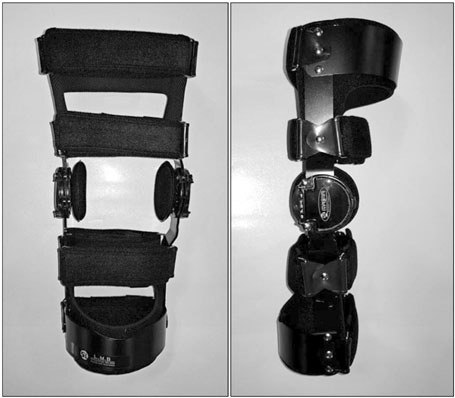Korean J Sports Med.
2018 Jun;36(2):63-70. 10.5763/kjsm.2018.36.2.63.
Functional Brace of Anterior Cruciate Ligament: Systematic Review
- Affiliations
-
- 1Department of Orthopaedic Surgery, Konkuk University Medical Center, Seoul, Korea. boram107@hanmail.net
- 2Department of Orthopaedic Surgery, Allgoden Hospital, Daegu, Korea.
- KMID: 2429178
- DOI: http://doi.org/10.5763/kjsm.2018.36.2.63
Abstract
- Functional knee braces are commonly prescribed to support anterior cruciate ligament (ACL) reconstruction. The aim of this study was to evaluate the current literature on the use of functional knee braces of ACL with respect to biomechanical, clinical and functional outcomes. A literature search was conducted (2000 to 2017) by two independent reviewers using PubMed MEDLINE database. Articles were retrieved by an electronic search using keywords (anterior cruciate ligament, brace, and bracing) and their combinations. Current functional braces used to treat ACL injury were identified. Studies that met inclusion criteria were assessed for pertinent data. Fourteen studies met the inclusion criteria. Functional knee brace reportedly did not improve long-term clinical and functional outcomes following ACL reconstruction, but some studies suggest that functional brace may have some benefit with regard to biomechanics, proprioception, and subsequent injury rates. Functional knee brace after ACL reconstruction was found no significant difference in clinical and functional outcomes. But Further large-scale recent studies will be required to determine long-term outcomes of the brace.
Keyword
MeSH Terms
Figure
Reference
-
1. Granan LP, Bahr R, Steindal K, Furnes O, Engebretsen L. Development of a national cruciate ligament surgery registry: the Norwegian National Knee Ligament Registry. Am J Sports Med. 2008; 36:308–315.2. Granan LP, Forssblad M, Lind M, Engebretsen L. The Scandinavian ACL registries 2004–2007: baseline epidemiology. Acta Orthop. 2009; 80:563–567.
Article3. Lind M, Menhert F, Pedersen AB. The first results from the Danish ACL reconstruction registry: epidemiologic and 2 year follow-up results from 5,818 knee ligament reconstructions. Knee Surg Sports Traumatol Arthrosc. 2009; 17:117–124.4. Claes S, Hermie L, Verdonk R, Bellemans J, Verdonk P. Is osteoarthritis an inevitable consequence of anterior cruciate ligament reconstruction? A meta-analysis? Knee Surg Sports Traumatol Arthrosc. 2013; 21:1967–1976.
Article5. Lawrence JT, Argawal N, Ganley TJ. Degeneration of the knee joint in skeletally immature patients with a diagnosis of an anterior cruciate ligament tear: is there harm in delay of treatment? Am J Sports Med. 2011; 39:2582–2587.6. Petersen W, Tretow H, Weimann A, et al. Biomechanical evaluation of two techniques for double-bundle anterior cruciate ligament reconstruction: one tibial tunnel versus two tibial tunnels. Am J Sports Med. 2007; 35:228–234.7. Seon JK, Gadikota HR, Wu JL, Sutton K, Gill TJ, Li G. Comparison of single-and double-bundle anterior cruciate ligament reconstructions in restoration of knee kinematics and anterior cruciate ligament forces. Am J Sports Med. 2010; 38:1359–1367.8. van Eck CF, Schkrohowsky JG, Working ZM, Irrgang JJ, Fu FH. Prospective analysis of failure rate and predictors of failure after anatomic anterior cruciate ligament reconstruction with allograft. Am J Sports Med. 2012; 40:800–807.
Article9. Kim JG, Wang JH, Lim HC, Ahn JH. Femoral graft bending angle and femoral tunnel geometry of transportal and outside-in techniques in anterior cruciate ligament reconstruction: an in vivo 3-dimensional computed tomography analysis. Arthroscopy. 2012; 28:1682–1694.
Article10. Tashiro Y, Irarrazaval S, Osaki K, Iwamoto Y, Fu FH. Comparison of graft bending angle during knee motion after outside-in, trans-portal and trans-tibial anterior cruciate ligament reconstruction. Knee Surg Sports Traumatol Arthrosc. 2017; 25:129–137.
Article11. Smith SD, Laprade RF, Jansson KS, Aroen A, Wijdicks CA. Functional bracing of ACL injuries: current state and future directions. Knee Surg Sports Traumatol Arthrosc. 2014; 22:1131–1141.
Article12. Andersson D, Samuelsson K, Karlsson J. Treatment of anterior cruciate ligament injuries with special reference to surgical technique and rehabilitation: an assessment of randomized controlled trials. Arthroscopy. 2009; 25:653–685.
Article13. Pierrat B, Oullion R, Molimard J, et al. Characterisation of in-vivo mechanical action of knee braces regarding their antidrawer effect. Knee. 2015; 22:80–87.
Article14. Ewing KA, Begg RK, Galea MP, Lee PV. Effects of prophylactic knee bracing on lower limb kinematics, kinetics, and energetics during double-leg drop landing at 2 heights. Am J Sports Med. 2016; 44:1753–1761.
Article15. Giotis D, Zampeli F, Pappas E, Mitsionis G, Papadopoulos P, Georgoulis AD. Effects of knee bracing on tibial rotation during high loading activities in anterior cruciate ligament-reconstructed knees. Arthroscopy. 2013; 29:1644–1652.
Article16. Jalali M, Farahmand F, Mousavi SM, et al. Fluoroscopic analysis of tibial translation in anterior cruciate ligament injured knees with and without bracing during forward lunge. Iran J Radiol. 2015; 12:e17832.
Article17. Beynnon BD, Fleming BC, Churchill DL, Brown D. The effect of anterior cruciate ligament deficiency and functional bracing on translation of the tibia relative to the femur during nonweightbearing and weightbearing. Am J Sports Med. 2003; 31:99–105.
Article18. McDevitt ER, Taylor DC, Miller MD, et al. Functional bracing after anterior cruciate ligament reconstruction: a prospective, randomized, multicenter study. Am J Sports Med. 2004; 32:1887–1892.19. Harilainen A, Sandelin J. Post-operative use of knee brace in bone-tendon-bone patellar tendon anterior cruciate ligament reconstruction: 5-year follow-up results of a randomized prospective study. Scand J Med Sci Sports. 2006; 16:14–18.
Article20. Birmingham TB, Bryant DM, Giffin JR, et al. A randomized controlled trial comparing the effectiveness of functional knee brace and neoprene sleeve use after anterior cruciate ligament reconstruction. Am J Sports Med. 2008; 36:648–655.
Article21. Mikkelsen C, Cerulli G, Lorenzini M, Bergstrand G, Werner S. Can a post-operative brace in slight hyperextension prevent extension deficit after anterior cruciate ligament reconstruction? A prospective randomised study. Knee Surg Sports Traumatol Arthrosc. 2003; 11:318–321.22. Sterett WI, Briggs KK, Farley T, Steadman JR. Effect of functional bracing on knee injury in skiers with anterior cruciate ligament reconstruction: a prospective cohort study. Am J Sports Med. 2006; 34:1581–1585.23. Kocher MS, Sterett WI, Briggs KK, Zurakowski D, Steadman JR. Effect of functional bracing on subsequent knee injury in ACL-deficient professional skiers. J Knee Surg. 2003; 16:87–92.24. Wu GK, Ng GY, Mak AF. Effects of knee bracing on the functional performance of patients with anterior cruciate ligament reconstruction. Arch Phys Med Rehabil. 2001; 82:282–285.
Article25. Wu GK, Ng GY, Mak AF. Effects of knee bracing on the sensorimotor function of subjects with anterior cruciate ligament reconstruction. Am J Sports Med. 2001; 29:641–645.
Article26. Mortaza N, Abu Osman NA, Jamshidi AA, Razjouyan J. Influence of functional knee bracing on the isokinetic and functional tests of anterior cruciate ligament deficient patients. PLoS One. 2013; 8:e64308.
Article27. Palm HG, Brattinger F, Stegmueller B, Achatz G, Riesner HJ, Friemert B. Effects of knee bracing on postural control after anterior cruciate ligament rupture. Knee. 2012; 19:664–671.
Article28. Strutzenberger G, Braig M, Sell S, Boes K, Schwameder H. Effect of brace design on patients with ACL-ruptures. Int J Sports Med. 2012; 33:934–939.
Article29. Rice DA, McNair PJ. Quadriceps arthrogenic muscle inhibition: neural mechanisms and treatment perspectives. Semin Arthritis Rheum. 2010; 40:250–266.
Article30. Urbach D, Awiszus F. Impaired ability of voluntary quadriceps activation bilaterally interferes with function testing after knee injuries: a twitch interpolation study. Int J Sports Med. 2002; 23:231–236.
Article31. Suter E, Herzog W, Bray RC. Quadriceps inhibition following arthroscopy in patients with anterior knee pain. Clin Biomech (Bristol, Avon). 1998; 13:314–319.
Article32. Urbach D, Nebelung W, Becker R, Awiszus F. Effects of reconstruction of the anterior cruciate ligament on voluntary activation of quadriceps femoris a prospective twitch interpolation study. J Bone Joint Surg Br. 2001; 83:1104–1110.33. Pamukoff DN, Pietrosimone BG, Ryan ED, Lee DR, Blackburn JT. Quadriceps function and hamstrings co-activation after anterior cruciate ligament reconstruction. J Athl Train. 2017; 52:422–428.
Article
- Full Text Links
- Actions
-
Cited
- CITED
-
- Close
- Share
- Similar articles
-
- Ligament Reconstruction in Congenital Absence of the Anterior Cruciate Ligament: A Case Report
- The Prevention of Posterior Displacement of Tibia During Treatment of Posterior Cruciate Ligament Injury Using Modified Quengel Hinge
- Recent Evolution of Cruciate Ligament Surgery of the Knee
- Ganglion Cysts of the Anterior Cruciate Ligament: Three cases report
- Distal Advancement of the Loose Anterior Cruciate Ligament



